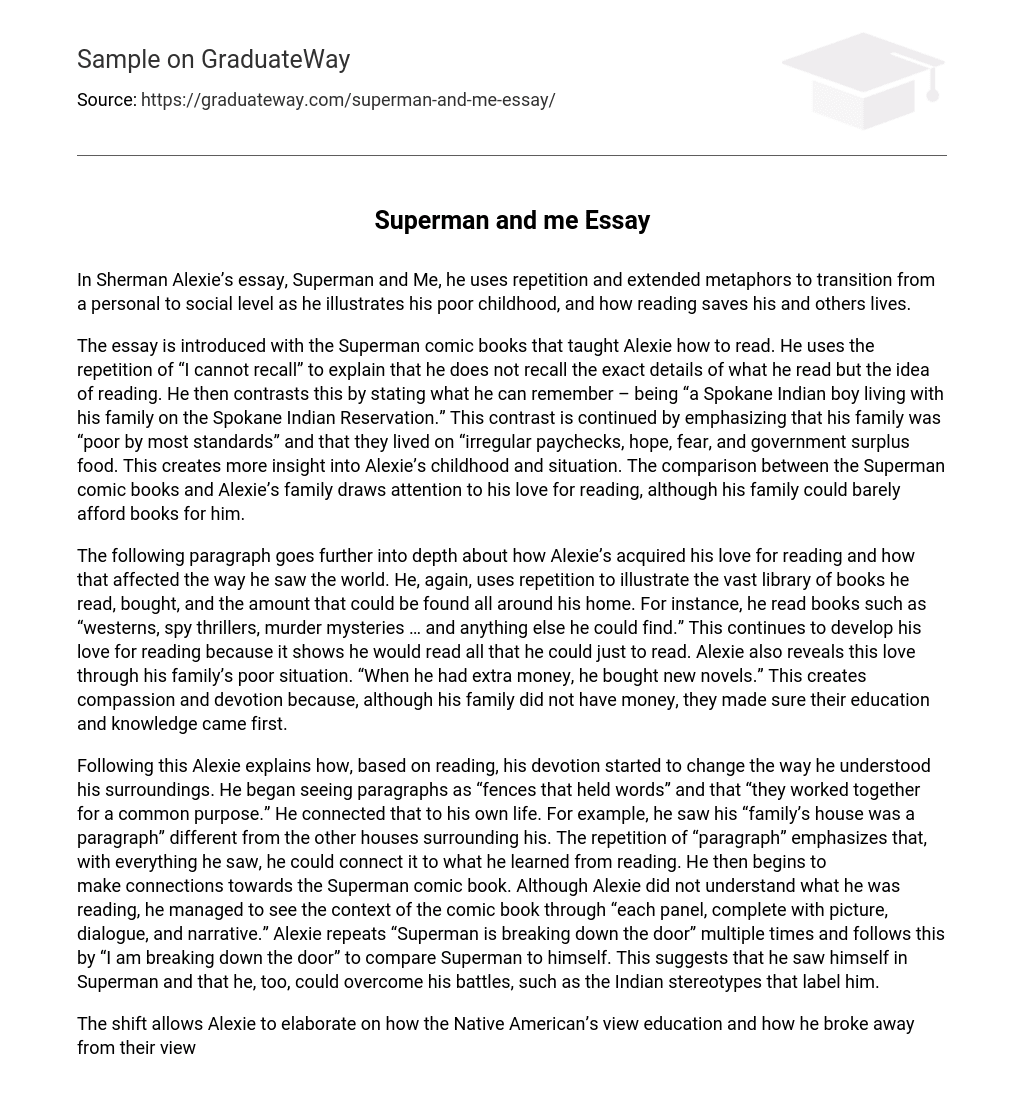Sherman Alexie’s essay, “Superman and Me,” employs repetition and extended metaphors to shift from a personal to social perspective, effectively portraying his impoverished upbringing and emphasizing the transformative power of reading in his life and the lives of others.
The essay begins with a discussion of how the Superman comic books helped Alexie learn to read. The repeated phrase “I cannot recall” highlights that while he doesn’t remember the specifics of what he read, he does remember the concept of reading. He contrasts this by sharing what he does remember – being a Spokane Indian boy growing up on the Spokane Indian Reservation. This contrast is further highlighted by emphasizing that his family was considered poor by most standards and relied on irregular paychecks, hope, fear, and government surplus food. This provides more insight into Alexie’s childhood and circumstances. The comparison between the Superman comic books and Alexie’s family underscores his passion for reading, despite the financial challenges his family faced in affording books for him.
The following paragraph delves deeper into how Alexie developed his passion for reading and how it influenced his perspective on the world. He employs repetition once again to depict the extensive collection of books he devoured, purchased, and scattered throughout his home. As an example, he consumed books spanning various genres such as westerns, spy thrillers, murder mysteries, and anything else he could lay his hands on. This further nurtured his love for reading as it exemplifies his unwavering commitment to consume any literature available to him. Alexie also divulges his affection for reading through his family’s impoverished circumstances. “Whenever he had spare funds, he would invest in new novels.” This showcases his empathy and dedication as his family prioritizes education and knowledge despite their financial struggles.
Alexie explains how reading changed his perception of his surroundings. He started to see paragraphs as “fences that held words” and understood that they worked together for a common purpose. This made him realize that even his family’s house was distinct from the surrounding houses, like a paragraph. The repetition of “paragraph” emphasized how he could relate everything he saw to what he learned from reading. Additionally, he discovered connections between reading and Superman comic books. Although he didn’t fully understand the comics, he could grasp their context through the combination of pictures, dialogue, and narrative in each panel. By repeating the phrase “Superman is breaking down the door” and following it with “I am breaking down the door,” Alexie likened himself to Superman and conveyed that he could triumph over Indian stereotypes by seeing himself as a superhero.
The shift in perspective allows Alexie to delve into the Native Americans’ perspective on education and how he diverged from their beliefs. He initiates with the statement that “a smart Indian is a dangerous person, widely feared and ridiculed by Indians and non-Indians alike,” signifying his sense of being different among other Indians. Various stereotypes, like struggling with basic reading or expecting failure in the non-Indian world, were attributed to Indians, as he highlights by repeatedly using the pronoun “they” to differentiate himself from his Indian classmates. He maintains this pattern of categorizing his Indian peers separately from himself. Despite his desire not to be perceived as one of them and burdened by the low expectations of the non-Indian world, Alexie was still labeled as an Indian, evident from the employment of the pronoun “we.”
Alexie faced stereotypes as an Indian, but he refused to be defined by them. He fought, just like Superman, to break down the barriers he encountered. Throughout his essay, he repetitively emphasizes the divide between himself and other Indians. He uses the pronoun “I” to assert his individuality. He declares, “I refused to fail. I was smart. I was arrogant. I was lucky…” not only to critique his fellow Indians but also to demonstrate his ability to surpass the expectations of the Non-Indian world.
Alexie’s love for books stemmed from the need and necessity it served in his life, making it surprising when he himself became a writer. He specifically engages in composing “novels, short stories, and poems,” despite this being something that Indians were not traditionally taught. In fact, writing was considered to be beyond the capabilities of Indians, and was neither expected nor seen as achievable by the Non-Indian world. Alexie reflects on how he never received formal instruction in writing, and yet he endeavors to visit schools as frequently as possible in an attempt to rescue students from their predicaments, much like Superman. He identifies two types of students: those who are eager to learn, and those who sit in the back rows and disregard his presence. While the latter group fits neatly into the Indian stereotype, Alexie refuses to let this be their defining characteristic. He perseveres by challenging the metaphorical locked doors that impede their progress, embodying the determination of Superman to defy their stereotypes. In essence, he seeks to protect and uplift them by trying to save their lives.
Alexie’s effective utilization of repetition and extended metaphors effectively highlights the significance of reading and education in an individual’s life in his portrayal of a transformation from a impoverished Indian boy to a superhero resembling Superman.





